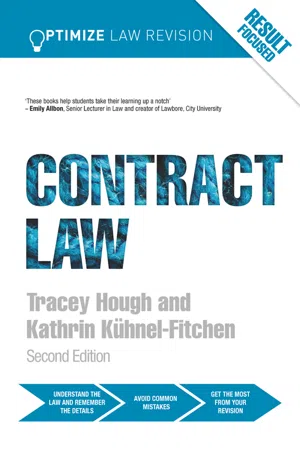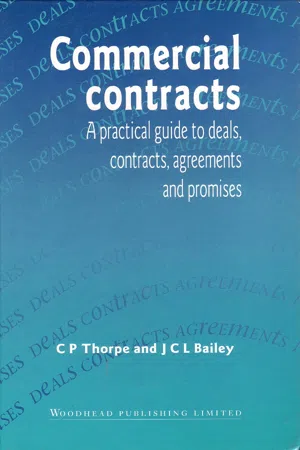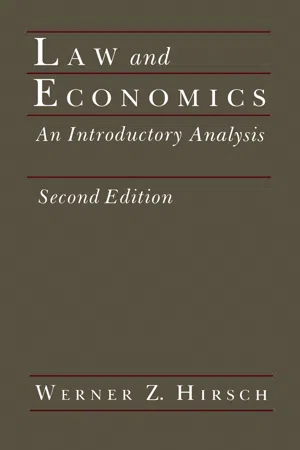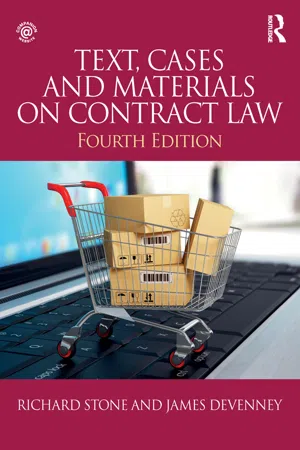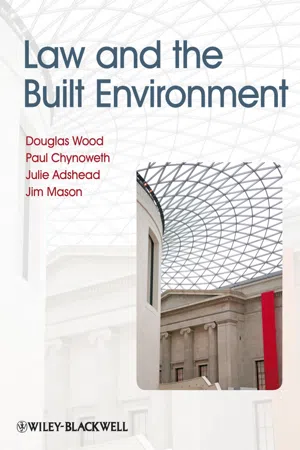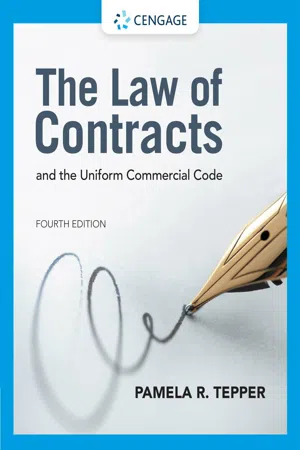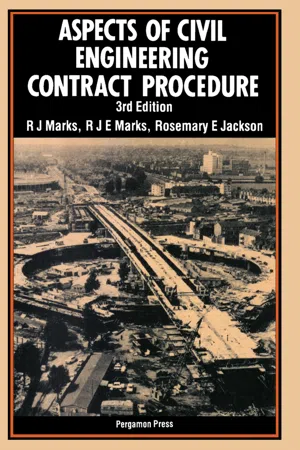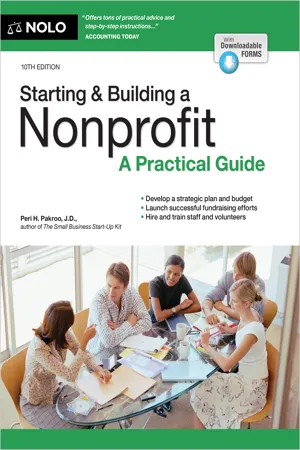Law
Contract Terms
Contract terms refer to the specific details and conditions outlined in a legally binding agreement between parties. These terms typically include the rights and obligations of each party, payment terms, delivery schedules, and any other relevant provisions. Clear and precise contract terms are essential for ensuring mutual understanding and compliance between the parties involved.
Written by Perlego with AI-assistance
Related key terms
1 of 5
9 Key excerpts on "Contract Terms"
- eBook - PDF
- Kathrin Kuhnel-Fitchen, Tracey Hough(Authors)
- 2017(Publication Date)
- Routledge(Publisher)
Revision objectives ? Understand the law Remember the details Reflect critically on areas of debate Contextualise Apply your skills and knowledge ? Unfair Contract Terms Act 1977 Consumer Rights Act 2015 Hollier v Rambler Motors (AMC) Ltd [1972] British Crane Hire Corp Ltd v Ipswich Plant Hire [1975] ? , ? Terms 3 Chapter Map Terms Implied terms Classification of terms Exemption clauses Express terms Conditions Innominate terms Terms implied by statute/parliament Terms implied at common law/in law Unfair Contract Terms Act 1977 Consumer Rights Act 2015 Terms implied by law Terms implied by custom Terms implied in fact Warranties Incorporation Parol evidence rule Interpretation 60 Optimize Contract Law Introduction Whilst offer, acceptance and consideration are described as the basic requirements for a contract, terms might best be described as the ‘ingredients’ of the contract: they tell us what each party to the contract is expected to do under the contractual agreement. Terms thus identify the respective obligations of each party under the contract: they amount to contractual promises. Contractual terms are, therefore, to be distinguished from mere puffs or representations which are non-promissory in nature and do not amount to terms: a puff is an advertising statement which praises the advertised goods in such vague/boastful terms that the statement made cannot be taken seriously. A representation is a statement which induces one party to enter the contract but which does not form part of the contract, i.e. which does not amount to a contractual term. This distinction is important as only the breach of a contractual obligation/term will give rise to liability for damages for breach of con-tract – if a puff is broken/false, no liability is incurred for this; if a representation is broken/false, the remedies, if any, are those for misrepresentation (see Chapter 4 on Misrepresentation). - eBook - PDF
Commercial Contracts
A Practical Guide to Deals, Contracts, Agreements and Promises
- Chris Thorpe, John Bailey(Authors)
- 1996(Publication Date)
- Woodhead Publishing(Publisher)
This is not however a technical legal requirement like that of consideration. It is simply a reflection of the parties' freedom of contract and the cardinal principle that it is for the parties and not for the court to decide what the terms of their transaction should be. 4.2.2 The context of a transaction In order to identify the basic terms of a transaction it is often necessary to consider the context of the parties' words as well as their content. An item sold at an auction may be described only as 'a mahogany desk', which does not in itself identify what goods are being sold. But there is no doubt about what goods the successful bidder has contracted to buy: it is the desk labelled LOT 101 which was on display while the bidding took place. We considered a similar situation in section 3.1.5 with a contract for the sale by A of 'my Morris 1000 Traveller'. Provided that A owns only one such car it is clear what goods are being sold. But if he owns two, then unless it is clear from the context which he has agreed to sell the agree-ment is void for uncertainty. In both of these examples the parties had specific goods in mind when they entered into the contract, but with most commercial contracts for the sale of goods this is not the case. When an oil refinery contracts to purchase 500,000 barrels of crude oil, the par-ties probably do not have any particular 500,000 barrels in mind, in which case the contract is said to be for unascertained goods rather than specific goods. As long as the buyer gets the quantity and quality he contracted for he is not concerned where or how the seller obtains it. The parties must however have reached agreement on quantity, quality and price if the agreement is to be enforceable. 80 The terms of a contract 81 Their agreement on quality will usually involve a verbal descrip-tion of the oil but, if the agreement does relate to a specific cargo of oil, the seller may provide the buyer with a sample rather than specifying its quality. - eBook - PDF
Law and Economics
An Introductory Analysis
- Werner Z. Hirsch(Author)
- 2014(Publication Date)
- Academic Press(Publisher)
5 CONTRACT LAW INTRODUCTION Contract law has developed over the centuries as a means of facilitating economic exchanges. By providing guidelines for transactions other than those involving real property, it helps increase the wealth of the nation. To facilitate the assessment of contract law, its basic legal premises are first presented. After the nature of a contract is defined and related to the notion of consideration, a number of formation defenses are ex-plored. Thereafter, performance defenses, the notion of anticipatory repudiation, and damages rules are explored. After setting forth the legal principles of contract law, I examine some of its economic aspects. The economic framework used allows the posi-tions of the buyer and the seller in general, within credit transactions in particular, to be evaluated. The focus is on transaction costs in the for-mation and performance stages, and on evaluation of different contract clauses. The unconscionability of certain contract clauses and Contract Terms are also examined within this framework. THE BASIC LEGAL PREMISES OF CONTRACT LAW WHAT IS A CONTRACT? A contract is a promissory agreement for a future exchange, freely and voluntarily arrived at. The law of contracts is designed to facilitate the 129 130 5 CONTRACT LAW process of exchange and to minimize breakdowns, and thus it contrib-utes to transaction efficiencies. Within a system of contract remedies, incentives are provided to make good on promises. If the parties to the bargain agree, the law terms the agreement a contract, and for certain types of agreements society provides legal enforcement remedies should one of the parties decide to breach the contract. Contracts as a societal institution facilitate efficient exchange by providing a social mechanism for enforcing those agreements where aggregate value between the par-ties can be presumed to have increased. But not all promissory ex-changes in society are enforceable as contracts. - eBook - PDF
- Richard Stone, James Devenney(Authors)
- 2017(Publication Date)
- Routledge(Publisher)
Doctrine lays down the constit-uents of a contract (agreement, consideration, certainty, intention and, in exceptional cases, written formal-ity) as well as stipulating the conditions of enforceability (the absence of fraud, coercion, illegal purpose and so on). There will be cases where, for one reason or another, doctrine is uncertain in its application. However, for the most part, lawyers will expect to recognise a ‘contract’, as specified by the law of contract, when they THE SUBJECT MAT TER OF CONTRACT LAW | 11 see one. On the other hand, whilst we might hope to construct a definition of a ‘contract’ around the shared idea of an enforceable transaction, there is little agreement about how this is best articulated. Some defi-nitions might centre on the idea of an enforceable agreement; others might be anchored to the concept of an enforceable promise (or set of promises); and others might emphasise that contracts are essentially exchanges, or perhaps bargained-for exchanges. Which definition, if any, is correct? As with any question of definition, it is important to be clear about what kind of defining statement is at issue. Broadly speaking, definitions are either stipulative, prescriptive, or reportive. Whereas a stipulative defi-nition specifies (in the definer’s own lexicon) a particular meaning for a word (or a concept), and a prescrip-tive definition purports to lay down for others such a meaning, a reportive definition (as we might expect to find in a dictionary) purports to describe usage (in a particular place at a particular time by a particular group) of a particular word (or concept). When we ask for a general definition of a ‘contract’, we are not asking for a stipulation; we are not interested in a particular definer’s idiosyncratic usage of the term. Nor are we asking for a prescription as to the usage of this term; in a sense, the law of contract already so prescribes. - eBook - PDF
- Douglas Wood, Paul Chynoweth, Julie Adshead, Jim Mason(Authors)
- 2021(Publication Date)
- Wiley-Blackwell(Publisher)
2 The Law of Contract 2.1 General principles The law of contract is frequently the fi rst ‘ case law ’ subject to which students are introduced when they commence their legal studies. The main reason for this is that contracts affect the general public more than most areas of law and arise daily in business and commercial life. The contract is the most important stage in the process when land or buildings are transferred and when building projects are undertaken. The ‘ golden age ’ of the law of contract was in the nineteenth century when its major principles were evolved on free market ideologies. Many of the cases referred to in this chapter date from this ground breaking period. The case illustrations used are not limited to this period, however, and the case law referred to in this chapter ranges from the very old to the very modern. A contract is a legally binding agreement. It is a bargain and each side, or party to the contract, must contribute something to it for it to be valid. Not every agreement is a contract nor is it intended to be so. The legally binding element must be present before a valid contract can emerge. In other words the parties must be able to demonstrate their intention to adhere to the agreement made. The protection afforded by entering into a contract is that if it is broken by one party to it, the other party must be able to take the contract-breaker to court if desired. A distinction is made between the situation where the parties exchange mutual promises, known as a bilateral contract, and a unilateral contract where one party promises to do something in return for the other party carrying out some task. When the task is completed the promise made in a unilateral contract becomes enforceable. 2.2 Formalities A contract may be made in any form that the parties wish. This is the case regardless of the sums involved or the complexity of the agreement. - eBook - PDF
Construction Planning NQF4 SB
TVET FIRST
- Sparrow Consulting(Author)
- 2013(Publication Date)
- Macmillan(Publisher)
Topic 1 Introduction to construction contracts 2 Module 1: Define contract terminology Module 1 Define contract terminology Overview At the end of this module, you should be able to: • Unit 1.1: Briefly define terms and concepts commonly found in construction contracts. (T1SO1LO1) • Unit 1.2: Explain the importance of reducing construction contracts to writing. (T1SO1LO2) • Unit 1.3: List the essential elements of a valid construction contract or agreement. (T1SO1LO3) • Unit 1.4: List the conditions or circumstances that would entitle one party no longer to be bound by a contract. (T1SO1LO4) (T1SO1LO5) • Unit 1.5: Explain the meaning and legal implications of the concepts caveat subscriptor and breach of contract. (T1SO1LO5) (T1SO1LO6) Introduction The South African law of contracts was developed from Roman law and is founded on the basic principle that every individual must honour his or her promises. In the construction industry, a building contract may be defined in terms of: • One party (the contractor), who agrees to perform construction, engineering works or some other form of services. • Another party (the client or employer), who in turn pays the contractor. In this unit, you will look at some terminology that is commonly used in construction contracts. This will help you to understand the terms of agreement between the various parties involved in a contract. Did you know? The word “contract” comes from the Latin word “contractus”. It is an agreement (between two or more parties) to complete a specific amount of work for a specific value. Other words that come from it are “contractors” and “contracting”. 3 Module 1: Define contract terminology Unit 1 .1: Briefly define terms and concepts commonly found in construction contracts . (T1SO1LO1) Agent or employer’s representative: An individual or organisation that acts in the name of, and on behalf of the client. The agent or employer’s representative takes on a certain level of risk. - Pamela Tepper(Author)
- 2021(Publication Date)
- Cengage Learning EMEA(Publisher)
14. ENTIRE AGREEMENT. This Agreement contains the entire agreement and understanding between the parties. This agreement shall be binding upon the heirs, personal representatives, successors and assigns of both the Seller and Buyer. This Agreement may only be amended in writing and signed by both parties. Time is of the essence in the performance of this Agreement. 15. GOVERNING LAW. This Agreement shall be governed by and enforced in accordance with the laws of the state of [add in your state] If jurisdiction should be exclusive in a state or county, state it in the document. 16. SPECIAL PROVISIONS: [Any special provisions between the parties should be listed here.] SIGNED THIS day of , 20 . DATE SELLER DATE PURCHASER [Always check laws of state to determine whether the signatures of the parties need to be witnessed or acknowledged.] Additional terms Signature: acceptance of terms by parties giving mutual assent 10th January 21 Jan 10, 2021 Jan 11, 2021 s/ Robert Wynn s/ Dennis Beerely SUMMARY 2.1 A contract is an agreement between two or more parties for value that is legally enforceable. All contracts must have six elements to be binding. The elements are offer, acceptance, consideration, mutual assent, capacity, and legality. Another element to consider is proper form, such as under the Statute of Frauds. 2.2 Contracts can have different classifications: (1) bilat- eral and unilateral; (2) express and implied; (3) executed and executory; (4) void, voidable, and unenforceable; and (5) formal and informal. In a bilateral contract, the parties exchange a promise for a promise, whereas in a unilateral contract only one party makes a promise, with the other party required to do some act in return. An express contract is one that is specifically stated. It can be oral or written. An implied contract, however, may be one of two types.- R. J. Marks, R. J. E. Marks, R. E. Jackson(Authors)
- 2013(Publication Date)
- Pergamon(Publisher)
2 Such uncertainty in a contract is clearly undesirable. It may be that standard terms on the back of orders, acceptances and acknowledgements can be drafted in such a way that they cancel out the other party's terms. That will prevent the other party winning the battle of the forms. But to draft terms which are guaranteed to prevail would be a difficult, if not impossible, task. The best that clever drafting can hope to obtain is that the terms of both parties are scrapped and that the contractor is paid a reasonable sum for his work. Because of these difficulties it is clearly preferable to enter into a formal contract wherever possible so that there may be certainty as to the terms of the agreement. LEGAL ASPECTS OF CONTRACTS Certainty of Terms 27 In order to constitute a valid contract the parties must so express themselves that their meaning can be determined with a reasonable degree of certainty. 1 A purported offer and accept-ance in which the terms of the proposed agreement are left so vague that it is impossible to determine what the parties agreed does not constitute a binding contract. This is not to say that the inclusion of a vague or meaningless term will necessarily invalidate the whole contract. Provided that no essential term is omitted or left uncertain the contract will be binding. 2 The terms essential, however, to a contract relating to a civil engineering project are likely to be numerous. One term which is clearly essential to a building or civil engineering contract is the price or, at least, the means of ascertaining the price. In 1975 the Court of Appeal considered a case in which developers approached a building contractor to ask him to build a motel, a hotel, and a filling station which were to form a complex of buildings on the same site.- eBook - PDF
Starting & Building a Nonprofit
A Practical Guide
- Peri Pakroo(Author)
- 2024(Publication Date)
- NOLO(Publisher)
Many people use the terms “contract” and “agreement” interchangeably, but technically, the question boils down to whether the deal is binding, enforceable in a court of law. Some contracts are 50-page documents filled with Latin phrases and legal boilerplate; others are two- or three-sentence agreements scratched out on a napkin. Regardless of its length or formality, a contract will be legally binding if it meets these two requirements: • The parties have reached an agreement—that is, an offer has been made by one party and accepted by the other. • Promises or other things of value have been exchanged, such as money, merchandise, or a promise to perform services. Generally, a contract is legally binding whether or not it is in writing. However, there are some situations when a contract must be in writing to be valid—these are covered in “Oral Versus Written Contracts,” below. ! CAUTION Nonprofits must honor their contracts, just like other businesses. The legal rules covering contracts apply to nonprofits just the same as any other entity. As long as the contract is valid under the rules of contract law (as described in this section), it binds a nonprofit just as it would a for-profit business or any other entity. Agreement Between Parties Although it might seem obvious, a contract is valid only if all parties really do agree on every major issue. Sounds simple enough, but in real life it can often be hard to tell the difference between a preliminary CHAPTER 8 | UNDERSTANDING CONTRACTS AND AGREEMENTS | 161 discussion and a true agreement. To help bring the dividing line into clearer focus, the law has developed rules that define when an agreement has been reached. The basic rule is that an agreement exists when one party makes an offer and the other party accepts it. If the acceptance of the offer is followed by an exchange of promises or other things of value (discussed next), a binding contract has been created.
Index pages curate the most relevant extracts from our library of academic textbooks. They’ve been created using an in-house natural language model (NLM), each adding context and meaning to key research topics.
